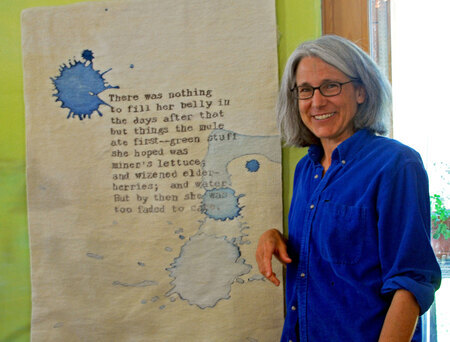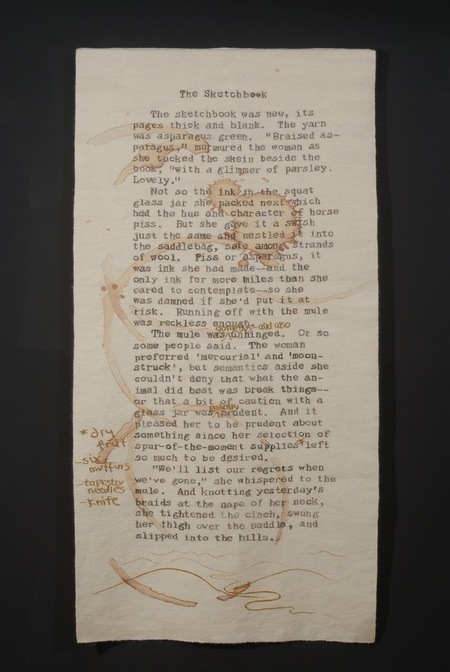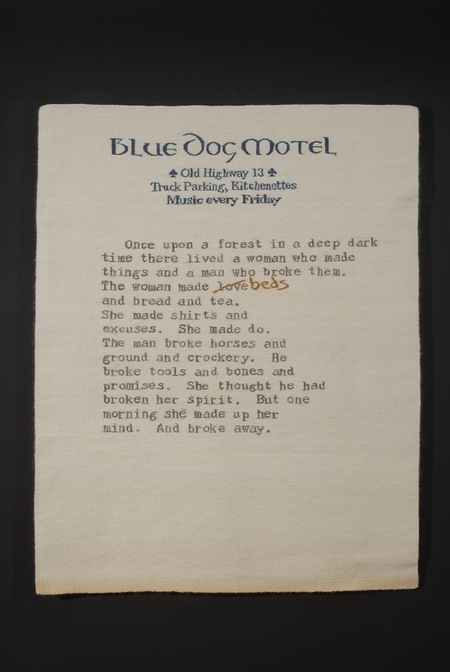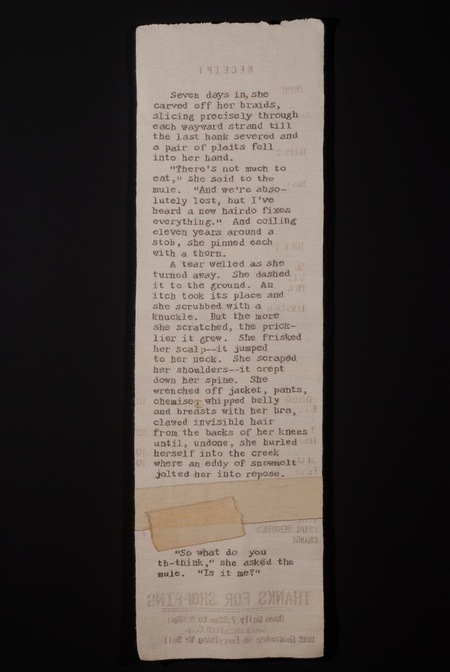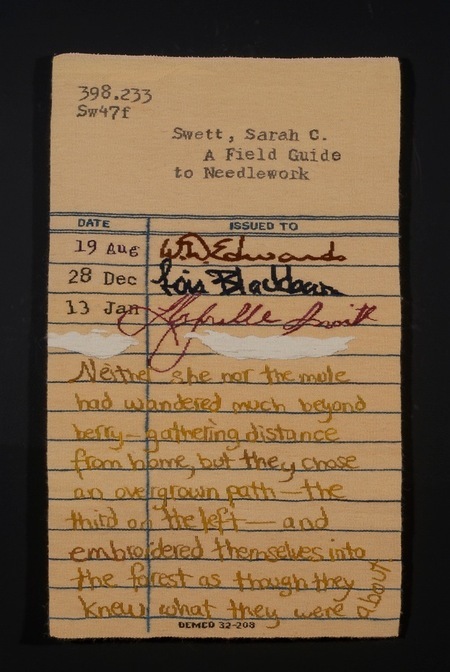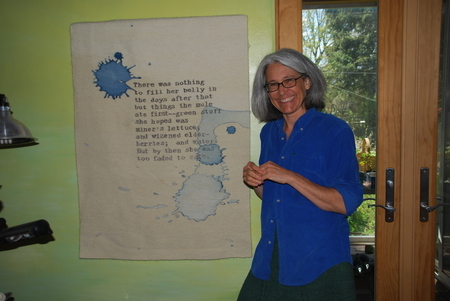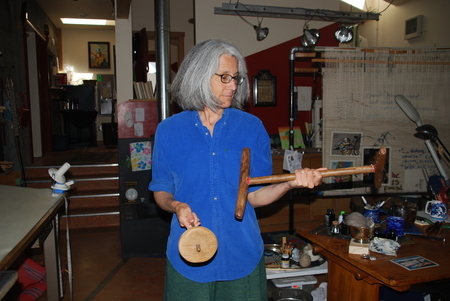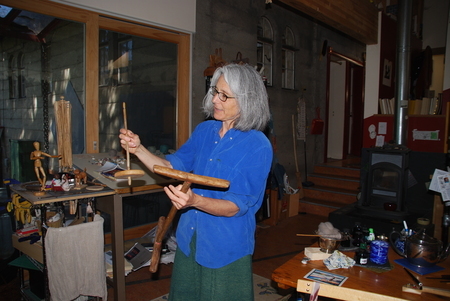Episode 16 : Domesticity : an interview with Sarah Swett Item Info
In this episode, titled “Domesticity,” we hear from Sarah Swett, with stories about her first backcountry employers, Punk and Carolyn Wolfenbarger, owners of the North Star ranch. For several years, Sarah lived and worked on outfitter ranches in the heart of the Selway-Bitterroot Wilderness, and knew many of the long-time residents of the area. Originally from Brooklyn, she fell in love with the West, the wilderness and with the fibers and textiles that she has used to tell her stories. Although life on a wilderness ranch involved long hours of work, cooking, caring for livestock, making hay, fixing fence or repairing buildings, Sarah used to get up at 4:00 am to knit and weave and spin, creating stories in pictures much like the stories told up and down the river in the backcountry.
For more of Sarah’s work, visit her web page.
Episode 16 : Domesticity : an interview with Sarah Swett [transcript]
00:00:00:00 - 00:00:26:13 Debbie Lee or Jane Holman: Welcome to the Subway Bitterroot Wilderness History Project, which is made possible by a grant from the National Endowment for the Humanities. The University of Idaho, and Washington State University. Part of the project’s mission is to collect, preserve, and make public oral histories documenting the history and people of the subway. Bitterroot wilderness. For more information, please visit our website at SPW Lib argue.
00:00:26:13 - 00:00:28:21 Debbie Lee or Jane Holman: Idaho. Edu.
00:00:28:24 - 00:00:53:21 Debbie Lee or Jane Holman: And then I think people, I think people get so much out of being in a wilderness setting. Once you take away cars and money and telephones, people are different and they are different to each other, I think. And, and, and then they draw on things in themselves that maybe are a little rusty from our crazy life out here.
00:00:53:21 - 00:01:24:22 Debbie Lee or Jane Holman: Now, I think the ways that people get along when they’re isolated in a place like that, that they place that they want to be, are really it’s a wonderful thing.
00:01:24:24 - 00:01:49:18 Debbie Lee or Jane Holman: Thank you for joining us for the 16th episode of the Selway Bitterroot Wilderness History Project. In this episode, titled domesticity, we hear from Sarah Swett with stories about her first backcountry employers, Punk and Carolyn Wolfenbarger, owners of the North Star Ranch. For several years, Sarah lived and worked on outfitter ranches in the heart of the South Bitterroot Wilderness and knew many of the longtime residents of the area.
00:01:49:20 - 00:02:15:16 Debbie Lee or Jane Holman: Originally from Brooklyn, she fell in love with the West, the wilderness, and with the fibers and textiles that she has used to tell her stories. Although life on a wilderness ranch involved long hours of work cooking, caring for livestock, making hay, fixing fence, repairing buildings. Sarah used to get up at 4 a.m. to knit and weave and spin, creating stories and pictures much like the stories told up and down the river in the backcountry.
00:02:15:18 - 00:02:37:28 Sarah Swett: It was that, North Star. That was it. North. Okay, so that was the first. And what year was that? well, that was 1979 that we first went in. So it was the spring of 1980. It was May, came out, came out to pack, actually, and literally took my stuff out of the vehicle we were in.
00:02:37:28 - 00:03:06:08 Sarah Swett: Was Ian’s vehicle and put it in five, eight dog dicks. Then airplane and Dick took me in and dropped me off by. There I was with Doug for my new job and, ended up not leaving the Solway, not leaving that even immediate area for nine months. So that was my first chunk, and it was the first. It was a very to me and it made perfect sense.
00:03:06:08 - 00:03:25:25 Sarah Swett: It was very domestic. It was I instantly we had to be pruning the raspberries, digging up the garden and mowing and, cooking. And I learned what punk like for breakfast. And I learned what, like the kind of cook you see at 10:00 in the morning to go with his cup of coffee and, Carolyn came in shortly thereafter.
00:03:25:25 - 00:03:52:19 Sarah Swett: I think she was concerned at the time that I was in there by myself, and that punk wouldn’t show me how to run stuff properly. So she who had been in the midst of chemo, I mean, I was 19 and she was 70 and, she came in and started teaching me stuff and half of my job, it later turned out half of my job was helping just doing physical labor, gardening, cooking, haying, all that stuff.
00:03:52:19 - 00:04:22:23 Sarah Swett: The other half was was being Carolyn’s companion and doing all the stuff Carolyn would normally have done. which again, at that end of the cell for people who lived in there year round, full time was a lot of gardening, a lot of canning, a lot of berry picking, wine making. I believe we made 116 gallons of wine, which we made in garbage cans, 20 gallon garbage cans, mostly whatever was around service berry choke, cherry, elderberry.
00:04:22:25 - 00:04:41:27 Sarah Swett: not rhubarb. they did not have enough root rhubarb. We made raspberries sometimes if there was enough raspberries. But the idea for them was that Carolyn was a very social person and people came by and they expected they’d been coming for years. They lived in there for 30 years. So year round they had people stopping by all the time.
00:04:41:27 - 00:05:01:15 Sarah Swett: Forest service teams, everyone, and they were hospitable. So someone comes by, you offer them a drink, but who’s going to be packing and beer? You can’t pack in beer, so you make one. You can pack in sugar. Sugar is much easier to pack in, and you certainly weren’t going to pack in anything that you couldn’t pick. There. So the idea was to use the stuff that grew wild.
00:05:01:15 - 00:05:27:00 Sarah Swett: So a lot of our time or my time, not Carolyn. So much then was spent picking berries, which was a long and honorable tradition. And I learned much about Dodie, George and Dodie, who had lived at Running Creek until a few years before, and Dodie used to wear, I guess, these huge high snake boots because she was terrified of rattlesnakes, which, of course, were very prevalent there and on the lawn and sometimes meandering into the house.
00:05:27:00 - 00:05:42:02 Sarah Swett: And so, so that you do watch out. But if you have to pick four gallons of berries for every barrel of wine, it’s a lot of time outside in the brush picking berries.
00:05:42:05 - 00:05:54:27 Debbie Lee or Jane Holman: so you spent a lot of time with Carolyn. How would you describe her? I don’t think we’ve, talked to anyone who know knew her that intimately.
00:05:54:29 - 00:06:28:05 Sarah Swett: well, I mean, the first thing is wonderful. She was wonderful. She Bosc was extremely brusque at times, but also extremely kind and interesting and very interested. She had a I think some things were hard for me because something that she, she loved and valued education. she’d grown up in Derby and had been able to go to the University of Montana for one year, and that had not been able to afford to continue to go.
00:06:28:08 - 00:06:46:11 Sarah Swett: ended up working in card Bank, running a bar, and eventually ran her own bar. in, in, in, Derby. And that’s where she met punk and had her own house and had it, you know, had made a life for herself and ended up then marrying punk and moving into the Selway. But she never was able to go back to college.
00:06:46:11 - 00:07:05:13 Sarah Swett: And because I had left Harvard of all places, she really felt that I should go back and that it was kind of a waste. Although she tried not to say that, because at the same time she needed to take it’s, you know, people are okay who don’t, but don’t throw away, that education, which I was all about throwing it away.
00:07:05:13 - 00:07:32:04 Sarah Swett: I was like, but Carolyn, I’m so much more interested in what you know than and what they know. so she wrote poetry, she recited poetry. She read endlessly. we talked a lot about books. We she would give me books. So they read a lot of Reader’s Digest condensed books, which I had never seen in my life before, but became a great consumer of after nine months, I’d read pretty much everything there, which is great, very peaceful.
00:07:32:04 - 00:07:47:29 Sarah Swett: She and punk and I in the evenings. after a hard days of work, we would read and then we would talk about them. a couple of my favorite Carolyn stories. One had to do with cooking, because I love to cook, and I thought I was a pretty good cook, and I learned to cook on a wooden stove.
00:07:47:29 - 00:08:12:07 Sarah Swett: And she really educated me on how, you know, you need this kind of wood in this shape, wood for this. You know, if you’re making bread versus making this versus making that, versus cooking the hot cakes that you make every single day. Hotcakes cooked on top of the stove, mix up the our overnight for. All that was very, very ritualized, very steady.
00:08:12:07 - 00:08:39:01 Sarah Swett: Which suits me down brown because I love routine and I love, you know, things. But then I got in trouble for some things, like the first time. Well, probably the third time I cooked green beans when we had them in the garden. And Carolyn said, oh, you fix them this way. Well, yes, I had lightly steamed them with a little butter and salt and pepper.
00:08:39:04 - 00:08:58:23 Sarah Swett: I had learned at that point to say, well, Carolyn, and I said, what’s wrong with them? And she said, they’re inedible. Oh, okay. So how would you fix them, Carolyn? Well, you cut them into small pieces and you cut up some bacon, and you cook them with onion and bacon for at least 20 minutes until they’re tender.
00:08:58:23 - 00:09:18:16 Sarah Swett: You can digest them. Okay. So from then on, that that was it for steamed green beans. And interestingly, by the end of the nine months of living there, I had so adopted her ways of cooking that that, and that was what some other friends are like. Sarah, you’re peeling the potatoes. Why are you you’ve never used to peel potatoes.
00:09:18:16 - 00:09:23:14 Sarah Swett: Well, right. You don’t actually have to anymore.
00:09:23:16 - 00:09:45:26 Debbie Lee or Jane Holman: Thank you for joining us for this episode of the Selway Bitterroot Wilderness History Project, which has been made possible by the National Endowment for the Humanities, the University of Idaho, and Washington State University. The project coordinator is Debbie Lee, recorded and produced by Aaron Jepson.
00:09:45:29 - 00:09:50:16 Debbie Lee or Jane Holman: This.
Gallery
- Title:
- Episode 16 : Domesticity : an interview with Sarah Swett
- Creator:
- Debbie Lee; Jane Holman; Sarah Swett
- Date Created (ISO Standard):
- 2011-05-11
- Description:
- Interviewee: Sarah Swett | Interviewer: Debbie Lee and Jane Holman | Location: Moscow, Idaho | Date: May 11, 2011 | In this episode, titled 'Domesticity,' we hear from Sarah Swett, with stories about her first backcountry employers, Punk and Carolyn Wolfenbarger, owners of the North Star ranch.
- Subjects:
- podcasts personal recollections agriculture women recreation outfitters
- Section:
- Wilderness Voices
- Location:
- Selway-Bitterroot Wilderness (Idaho and Mont.)
- Publisher:
- Wilderness Voices, The Selway-Bitteroot Wilderness History Project, https://selwaybitterrootproject.wordpress.com/
- Original URL:
- https://selwaybitterrootproject.wordpress.com/2012/05/01/domesticity/
- Source Identifier:
- Selway-Podcast-ep16
- Type:
- Sound
- Format:
- audio/mp3
- Language:
- eng
- Preferred Citation:
- "Episode 16 : Domesticity : an interview with Sarah Swett", The Selway-Bitterroot Wilderness History Project, University of Idaho Library Digital Collections, https://www.lib.uidaho.edu/digital/sbw/items/sbw298.html
- Rights:
- Copyright: The Selway-Bitteroot Wilderness History Project. In Copyright - Educational Use Permitted. For more information, please contact University of Idaho Library Special Collections and Archives Department at libspec@uidaho.edu.
- Standardized Rights:
- http://rightsstatements.org/vocab/InC-EDU/1.0/

